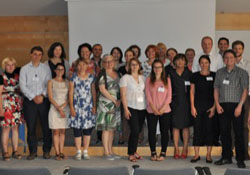Summer School on using evidence to promote health equity and well-being

On 6–7 July 2016, Pomurje Region (Slovenia), a member of the WHO Regions for Health Network (RHN), hosted a Summer School on advocacy and translation of evidence for different audiences on intersectoral action for health equity and well-being that brought together senior civil servants and public health experts from across the WHO European Region.
The Summer School was opened by the Minister of Health of Slovenia, Milojka Kolar Celarc. It was held in Ljubljana and organized by the Centre for Health and Development Murska Sobota, the WHO Collaborating Centre for Cross-sectoral Approaches to Health and Development.
30th anniversary of the Ottawa Charter for Health Promotion
The Summer School tied in with a EuroHealthNet study visit to Slovenia on cross-sector collaboration for healthy and active ageing in Slovenia. It also marked the 30th anniversary of the signing of the Ottawa Charter for Health Promotion at the First International Conference on Health Promotion in 1986. While the Summer School focussed on the development and evolution of approaches necessary to achieve successful intersectoral action for health and well-being, the values and principles of health promotion outlined in the Ottawa Charter are as relevant today as they were 30 years ago.
The Summer School followed a participative approach including participant presentations, panel discussions and group work. This ensured it achieved 3 key objectives.
- Ensure the exchange of knowledge on effective advocacy for health equity through intersectoral action.
- Discuss the role of different stakeholders and organizations in the advocacy process.
- Provide opportunities for exchange of knowhow, good practices and innovative approaches in developing and translating evidence for different audiences.
Translating evidence into policy
The first day focussed on how to effectively translate evidence to policy-makers, and the role that the Evidence-informed Policy Network (EVIPNet) Europe and WHO/Europe can play in supporting Member States. Representatives of Greece, the Netherlands, the Republic of Moldova, Slovenia and the United Kingdom (Scotland) shared experiences of good practice, and how particular challenges were overcome during the process.
Communicating health information
The second day addressed the communication of health information for different audiences with 2 key presentations. Dr Cory Neudorf, Chief Medical Health Office, Saskatoon Health Region, Canada, discussed how to use data profiling and social marketing campaigns for supporting health equity and poverty reduction strategies, focussing on the effective presentation of data through various media platforms, through his experience in Canada.
Luca Carra, WHO Senior Communications Consultant, presented how to communicate public health risks to different audiences via effective communication strategies. Key messages on this topic can be found in the RHN publication “Health and the environment: communicating the risks”.
Improving health and well-being
In the spirit of the Ottawa Charter, European Member States are engaged in a significant amount of work, providing a solid foundation to improve health and well-being throughout the European Region. This is demonstrated through their commitment to the ongoing implementation of Health 2020 and the goals of the United Nations 2030 Agenda for Sustainable Development, and participation in networks such as RHN and EVIPNet Europe.



